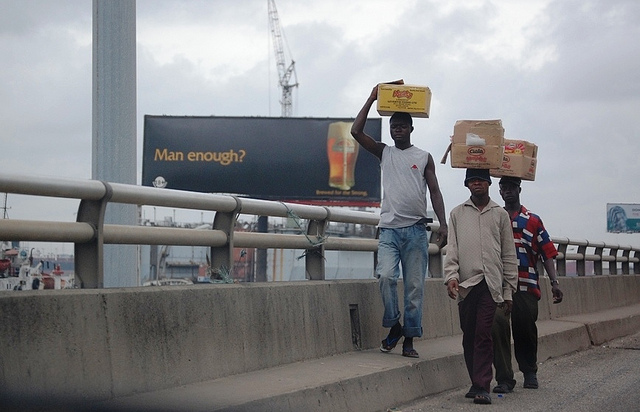"Street trading blues – legal or not in Nigeria?"
December 10th, 2013 In many countries like Nigeria, hawking and street trading are an age-old tradition. Most street vendors are between ten and 27 years old, writes Oluwafemi Ogunjobi, 21, a Correspondent from Gbongan in Nigeria, and beyond small financial gain have little control of their fate.
In many countries like Nigeria, hawking and street trading are an age-old tradition. Most street vendors are between ten and 27 years old, writes Oluwafemi Ogunjobi, 21, a Correspondent from Gbongan in Nigeria, and beyond small financial gain have little control of their fate.
In the good old days, shouts about products or a melodious tune would let potential customers know what wares street traders had to offer as they made their way from street to street.
This manner of trading makes goods available at the door steps of buyers and this has not in any way faded into oblivion as civilization crept in. These resourceful youths count their profit at the end of the day and channel the money towards their upkeep, perhaps towards their education.
The trading activity, for some, does not in any way disturb them from going to school or alter their dreams. Our people see nothing bad in it since it is an integral part of our culture. In fact, many great men in Nigeria have stories to tell on how they traded in the street to survive. Without mincing words, street trading is a commercial part of our tradition.
Most traders are not sent by their biological parents, as some of them have been sent away from their families to faraway climes as hired help. Sometimes, they are taken away by a relation on the pretext of helping them out but end up in the streets selling one thing or the other. Some people use the same pretext of helping poor families to take these children and traffic them to other cities.
The growing rate of unemployment accounts for so many social problems we are witnessing in the country – increased rates of armed robbery, kidnapping, thuggery and militancy among others. In the absence of jobs, many have taken to illegal means of livelihood. Others however choose to struggle through legal means. This is why it is not uncommon to see street trading in major cities in Nigeria.
Graduates do have jobs but continue trading to keep body and soul together. They are seen in busy areas where the traffic does not speed too fast, hawking electronics, electrical appliances, handsets, bread, bottled drinks, plantain chips, towels, and other items that are not heavy. Some use wheel barrows which they push up and down while others carry their wares in their hands, running after their buyers.
Some buyers prefer to buy from street traders because they sell at cheaper rates than those in the market or stores. This is because those selling in the super markets would like to maximize profits in view of what they pay as rents for the stores. But street traders who have nothing at stake sell at cheaper prices with little gains and keep life going. Their concern is a high rate of turnover. Even at night, these traders are seen on highways and express roads carrying on with the day’s hustles. Most of them retire to their pads around 11 p.m. The unfortunate ones among them suffer sexual assault from drunk drivers and terminal warlords. Those who cannot bear the disgrace abort resulting pregnancies, which sometimes leads to their death.
Among these traders, some turn to highway robbery and ‘pick-pockets’ to supplement their incomes. This made some state governments declare a total ban on street trading. But with no other means to survive, the traders continue to work hard to make a living. Especially with poor families, their young lads prowl the streets to make ends meet, rather than playing around or sleeping away.
In a visit to some of the motor parks in Nigerian cities, these ingenious youths expressed their views on their efforts to resist economic hardships. Kabiru, an 18-year old boy, explained that he lost his father two years ago. With no job for his mum and as the first child out of four, he has to take up the responsibility to fend for the family. Through trading, he has seen himself through secondary school.
Another woman, who sells plantain chips at a motor park in Ibadan explained “I come from Gbongan everyday to sell chips here at Ibadan.” Gbongan is one of the towns in Osun state, while Ibadan is the capital city of Oyo state.
“I am not restricted to a particular area because there are needs, demands and responsibilities to be met at home,” she said.
Chukwudi Obi, 23, had to halt his university studies when his parents could no longer pay his fees after their retirement. He resorted to selling headphones, car chargers, and other electronics on the road.
“I was in my second year when my parents lost their jobs. This made me stop my University education to settle for electronics hawking. I believe that as much as there is life, there is hope; there is much to be enjoyed after struggle,” Obi quipped.
With no end in view to this manner of trading, will the legislation be reviewed in favour of these ones? Or will they be totally scrapped from Nigerian roads? The answer still hovers in space.
photo credit: Seattle Globalist via photopin cc
…………………………………………………………………………………………………
About me: I am a purpose-driven Nigerian, student, freelance writer, and youth development advocate. I am continuously involved in productive activities that affect human lives, purpose and dignity.
I am passionate about writing. I seek to bring global headliners together through it, and equally to demonstrate how passionate commitment to excellent reporting and storytelling makes a difference in the lives of people everywhere. I also love travelling and playing soccer.
…………………………………………………………………………………………………
Opinions expressed in this article are those of the author and do not necessarily represent the views of the Commonwealth Youth Programme. Articles are published in a spirit of dialogue, respect and understanding. If you disagree, why not submit a response?
To learn more about becoming a Commonwealth Correspondent please visit:
http://www.yourcommonwealth.org/submit-articles/commonwealthcorrespondents/
…………………………………………………………………………………………………




